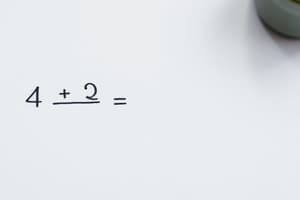Podcast
Questions and Answers
What is the sum of 47 and 68 when applying regrouping?
What is the sum of 47 and 68 when applying regrouping?
- 135
- 105
- 115 (correct)
- 125
What does adding a number to zero result in?
What does adding a number to zero result in?
- A smaller number
- Always zero
- The same number (correct)
- A greater number
What estimation can be used for the sum of 345 and 678?
What estimation can be used for the sum of 345 and 678?
- 800
- 600
- 1000 (correct)
- 900
What is the correct way to break apart the numbers in 456 + 234?
What is the correct way to break apart the numbers in 456 + 234?
Which of the following is a common error made during addition?
Which of the following is a common error made during addition?
When adding multiples of ten, how should they be aligned?
When adding multiples of ten, how should they be aligned?
In the number 345, which digit represents the tens place?
In the number 345, which digit represents the tens place?
What method can be used to visualize addition effectively?
What method can be used to visualize addition effectively?
Which of the following represents the concept of place value?
Which of the following represents the concept of place value?
Flashcards are hidden until you start studying
Study Notes
Understanding Addition Up to 1,000
-
Basic Concept:
- Addition involves combining two or more numbers to get a total.
- The sum can be calculated using various methods, such as mental math, regrouping, or using tools like number lines.
-
Place Value:
- Numbers are structured in place value (hundreds, tens, and units).
- Example: In 345, 3 is in the hundreds place, 4 in the tens, and 5 in the units.
-
Regrouping (Carrying):
- When the sum of a column exceeds 9, carry over to the next column.
- Example:
- 47 + 68
- Units: 7 + 8 = 15 (write down 5, carry over 1)
- Tens: 4 + 6 + 1 (carried) = 11 (write down 1, carry over 1)
- Result: 115
- 47 + 68
-
Adding multiples of 10:
- Easier to add when aligned in tens.
- Example: 230 + 270 = 500 (group tens first).
-
Adding with Zero:
- Any number plus zero equals the number itself.
- Example: 400 + 0 = 400.
-
Estimation:
- Round numbers to the nearest hundred to estimate sums quickly.
- Example: 345 + 678 can be estimated as 300 + 700 = 1000.
-
Practice Strategies:
- Break apart numbers to simplify addition.
- Example: 456 + 234 can be broken into (400 + 200) + (50 + 30) + (6 + 4).
- Use a number line to visualize addition.
- Break apart numbers to simplify addition.
-
Common Errors:
- Misalignment of digits can lead to incorrect sums.
- Forgetting to carry over when needed.
-
Applications:
- Everyday situations such as budgeting, shopping, and tracking scores.
Basic Concept
- Addition combines two or more numbers to produce a total sum.
- Various methods for calculation include mental math, regrouping, and using tools like number lines.
Place Value
- Numbers are organized in place values: hundreds, tens, and units.
- In the number 345, '3' represents hundreds, '4' represents tens, and '5' represents units.
Regrouping (Carrying)
- Regrouping is necessary when the sum of a column exceeds 9, requiring a carry to the next column.
- Example: For 47 + 68, add units (7 + 8 = 15), write down 5 and carry over 1. Then add tens (4 + 6 + 1 = 11), write down 1 and carry over 1, resulting in 115.
Adding Multiples of 10
- Adding multiples of 10 is simpler when numbers are aligned in tens.
- Example: 230 + 270 can be grouped as 200 + 300 + 30 + 70 = 500.
Adding with Zero
- Any number added to zero remains unchanged.
- Example: 400 + 0 = 400 demonstrates this principle.
Estimation
- Estimation involves rounding numbers to the nearest hundred to quickly gauge sums.
- Example: For 345 + 678, round to 300 + 700 to estimate as 1000.
Practice Strategies
- Break apart numbers to simplify the addition process.
- Example: 456 + 234 can be simplified to (400 + 200) + (50 + 30) + (6 + 4).
- Utilize a number line to visualize and aid the addition process.
Common Errors
- Misalignment of digits during addition can result in incorrect sums.
- Neglecting to carry over digits when necessary can also lead to errors.
Applications
- Addition is vital in everyday tasks such as budgeting, shopping, and tracking scores in games.
Studying That Suits You
Use AI to generate personalized quizzes and flashcards to suit your learning preferences.




